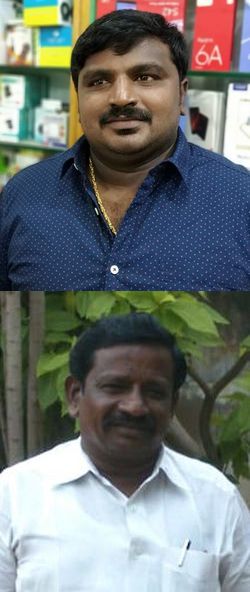On March 24, the day the nationwide lockdown was announced, a video shot near Chennai’s Spencer Plaza went viral. The video showed a cop managing traffic appealing to commuters with folded hands to stay indoors even as reports came in from many parts of the country that policemen had to resort to force to enforce the lockdown.
A few months later, however, the image of the Tamil Nadu police lay in tatters. The custodial torture and the death of a father and son in Sathankulam, a small town in southern Tamil Nadu’s Thoothukudi district, has brought to the fore the flaws within the home department, which is headed by Chief Minister Edappadi K. Palaniswami.
On June 24, as massive protests broke out in Sathankulam demanding justice for 58-year-old Ponraj Jayaraj and his 31-year-old son, J. Bennix, Palaniswami was in Coimbatore, reviewing Covid relief work. “The father died of respiratory illness and the son died of heart attack,” said the chief minister.
It all began on June 18 after Jayaraj kept his mobile phone store open beyond the permitted time during the Covid-19 lockdown. After he allegedly questioned the police, he was taken to the police station the next day. Bennix, who went to the station looking for his father, too, was taken into custody. Eyewitness accounts said Jayaraj and Bennix bled from their anuses after the police roughed them up. According to a handwritten statement from the Sathankulam government hospital accessed by THE WEEK, there were multiple marks of violence on Jayaraj’s and Bennix’s buttocks. The son had a sulcus (depression) on the right knee.
“On June 20, we were asked to bring lungis for them, as they were being taken to the magistrate. They were bleeding from their buttocks,” said Rajkumar, a relative of the deceased. Jayaraj and Bennix succumbed to their injuries on June 22. The Madurai bench of the Madras High Court took suo motu cognisance of the incident and asked the revenue department to take over the Sathankulam police station. It ordered a magisterial inquiry into the deaths and instructed the Crime Branch Criminal Investigation Department (CBCID) to investigate. The CBCID arrested inspector Sridhar, sub inspectors Balakrishnan and Raghu Ganesh and eight policemen.
But the government subsequently handed over the case to the CBI, prompting senior DMK leader Kanimozhi, who represents Thoothukudi in the Lok Sabha, to say that the AIADMK was trying to help the police.
The People’s Union of Civil Liberties (PUCL) has, meanwhile, written to the chief minister to cancel the order transferring the case to the CBI. “In earlier cases like the Thoothukudi Sterlite firing case and the suicide case of IIT student Fathima Latheef, the CBI probe did not go forward. Moreover, the CBI does not have the manpower and infrastructure compared with the CBCID. So, the investigation might not move forward and turn in favour of the accused,” said PUCL state general secretary K. Saravanan in his letter. The CBI’s performance in cases such as the 2009 Madras High Court attack case and the death of DSP Vishnupriya has invited a lot of criticism.
Human rights activist Henry Tiphagne said the Sathankulam case was unusual in the history of Tamil Nadu. “For the first time ever, a court ordered revenue officials to take control of a police station,” said Tiphagne, founder of People’s Watch, a Madurai-based human rights organisation. “The judges spoke to head constable Revathy, [who gave a statement about the custodial torture], as she feared for her life for telling the truth. The police in this case had to give protection to their own constable.”
The alleged involvement of four members of a community policing programme, Friends of Police, came in as yet another embarrassment for the police. FoP state administrator G. Lourduswami, however, said the four men were not part of the initiative and were volunteers enlisted by the local police for Covid-19 relief work. There were also allegations that the FoP at the Sathankulam station had links with Seva Bharati, an RSS-affiliated organisation. B. Rabu Manohar, the state secretary of Seva Bharati, however, denied the charges. Following the controversy, the FoP programme was banned by the government on the basis of a report by the director general of police.
The Tamil Nadu police saw a major reshuffle after the deaths. All 24 police personnel serving at Sathankulam station were transferred out in a single order. More than 50 senior officers were transferred statewide. Thoothukudi superintendent of police Arun Balagopalan was replaced by Villupuram SP S. Jeyakumar. He will serve with S. Murugan, the new south zone inspector general. Jeyakumar was the subject of a CBI probe in the 2018 gutkha scam; Murugan is under investigation in a sexual harassment case filed by a female IPS officer.
Sources in the police department said senior officers were chosen according to the whims and fancies of the ruling dispensation. A senior IPS officer, who was transferred from a high-profile post in a southern district to a low-profile post, said he did not want any prominent post under this government. “It will only add black marks to my career,” he said.
A senior officer who was shunted out of Chennai said there was no rationale behind his transfer. “There were many differences among the DGP, the intelligence and the chief minister regarding the final list,” he said. “The transfer, I feel, was done just by rolling the dice.” Sources said the transfer file was pending with the chief minister for a fortnight, and changes were made based on requests by AIADMK leaders.
“The transfers were a curious exercise,” said former DGP R. Nataraj, the current Mylapore MLA. “A particular system is followed by the home department for transfers, unlike in any other state.”



